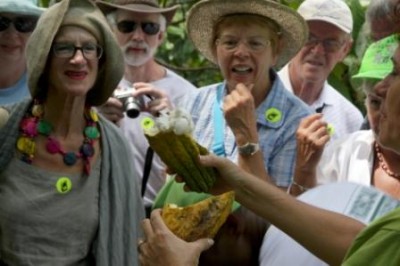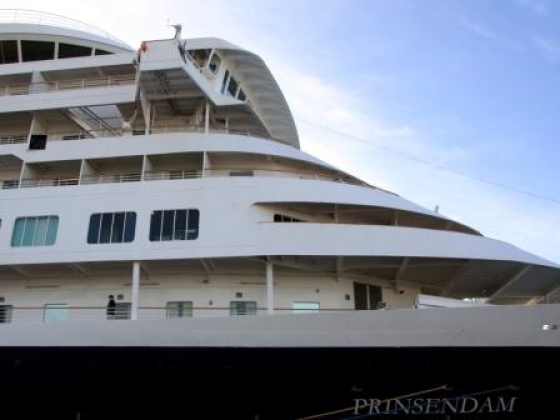Il-yay-oosh is the phonetic Portuguese rendition for “little island or islet”. The governor who took command of this “capitania” in the middle of the 16th century must have seen different things than we did. Ilhèus is a cozy little coast town, tucked in between the ocean and a relatively well-conserved stretch of primary Atlantic forest, rounding out southern Bahía State.
Personally, I would call it a rain forest for the very simple, but not necessarily adequate reason that it rains almost every day. Better make that “every night” because during the day it is hot and humid, with temperatures hovering between 28 and 34°C (74/88F) and relative humidity around 90%, year round! It follows that this day was easily the toughest, energy-sapping day of the past weeks. To walk – shuffle or loiter – in the oppressive heat, under a truly burning sun, perpendicularly above, leaves its marks on skin and breathing apparatus, even though everyone tries to immerse himself in any bath of shade within eyesight of the beaten path.
With its 220000 inhabitants spread over almost 800 square miles, you don’t find much a crowd in the small historic center, notwithstanding its charming buildings and streets, and relaxed atmosphere. I had planned to visit a cocoa plantation, rather than drinking caiperinhas in the famous Café Vesuvio or roaming along the sparsely populated, simmering beach. Actually, economically speaking, beachcombing would be much more efficient on Copacabana than in Ilhèus, a little patience does not hurt!
There is no doubt that Ilhèus exists only by the grace of sugar cane in the earliest days, and cocoa since the Germans arrived in 1850. By the end of 1989 they produced 400,000 tons, all for export, and the city, as well as the surrounding land, were among the most prosperous in Brazil. In this exhausting climate cocoa trees could be harvested three times per year.
The air-conditioned ride over asphalt-cushioned roads to a plantation, 60kms inland, was quite interesting. The coastal forest has 240 different species of trees per acre. Botany not having been my passion, I was already glad to recognize the banana trees (on the way back I also spotted the cocoa trees!). Brazilian bananas are quite special: thick and straight, rather than slender and rounded. They made me think of zucchini, although some of my companions did show different inspiration! (A dirty mind is a joy forever, I guess) In passing, let me mention that there were lime-orange trees as well, quite a curiosity!
As boom and busts cycles go, Ilhèus is a textbook example. After one dry year, a biblical plague spread over the plantations: fungi invaded the trees, with destructive force, and two years the miracle crop was reduced by 90%. The “coronels” sense of business had always been trumped by their shortsightedness, and, as they were filling their lazy pockets with loads of money, hard times had never been imagined, let alone been planned for. Everything imploded and dire poverty installed itself in the region in no time.
Brazil is still a land of resilient pioneers; it has to be, because it depends for much of its prosperity on the unpredictable nature. After the sudden departure of bankrupt coronels, a successful consolidation phase followed, including investment and brains. Although production is still at only 40% of the ’89 record, the revenues generated from it are almost 100%. Indeed, in the boom times the cocoanut was only used to make cocoa (or cacao), the primary ingredient for chocolate. These days every part of the fruit is being used.
 Cocoa is the basis for a plethora of excellent products, at least if one loves ice-cream, milkshake, cocoa juice, cocoa butter, cocoa liquor and pralines. All of that is in addition to the high margin cocoa powder business. In my “Explorer” role, I have tasted a lot of these delicacies, certainly those that were for free! The experience starts with the fresh seeds inside the shell. They are covered by a creamy, sweat, fruity and dense juicy substance. After you put this seed in your mouth you simply suck it off. Thereafter you bite the seed in two or three pieces and you discover the raw cocoa, a brown coagulated pasta, al dente – somewhat bitter but intensely “chocolate”!
Cocoa is the basis for a plethora of excellent products, at least if one loves ice-cream, milkshake, cocoa juice, cocoa butter, cocoa liquor and pralines. All of that is in addition to the high margin cocoa powder business. In my “Explorer” role, I have tasted a lot of these delicacies, certainly those that were for free! The experience starts with the fresh seeds inside the shell. They are covered by a creamy, sweat, fruity and dense juicy substance. After you put this seed in your mouth you simply suck it off. Thereafter you bite the seed in two or three pieces and you discover the raw cocoa, a brown coagulated pasta, al dente – somewhat bitter but intensely “chocolate”!
I could go on with the cocoa-ice water as thirst quencher (also for diabetics), cocoa-milkshake to re-energize (no luxury in the heat). As we all undoubtedly have experienced before: freshly picked or harvested fruit has no equal when it comes to a delirium for the taste butts. In closing, suffice it to add that I passed for the pralines and the liquor, giving priority to my dietary disciplines.
At this very moment we are sailing to Rio. The captain, an otherwise sober Norwegian and wool-died sailor, describes the arrival by sea in Rio in absolutely lyrical hyperbole. Not a man of too many words, he painted a romantic picture of the ship entering the bay, tomorrow morning at 6am, just before sunrise, and steaming along to dock at 8am. Definitely something to dream about tonight!
Prinsendam, Day 26 – Sunday Jan 30th, 2011
Too early for Carnival, but dancing the samba anyway!
P.S. As the street protests in Egypt are evolving, and the plight of the Tunisians is no longer interesting to the big media, I grabbed the opportunity, during this “sea day” to write down my concerns about those people and organizations that “create the news” for all of us – and why we should revolt against their self-serving opinion mongering! (you will find it under www.grimburger.com, click “conatus” and then “international”)
 Op het schip hebben ze de restaurants, en het personeel, “gepaleerd” voor een soort van privé carnaval. Het geeft een leuke aanblik – anders dan anders, zeg maar – maar blijft, in mijn stoïcijnse beleving, redelijk inhoudsloos. Omdat onze tafel slechts twee SS mannen telt, en vier SS vrouwen, en omdat in Rio het hoofdkwartier is gevestigd van “H. Stern” – een bekende (?) juwelier – was drie vierde van het gesprek gewijd aan edelstenen. De vier C’s zitten weer scherp in mijn geheugen: Carat, Clarity, Cut en Color. Brazilië schijnt voor sommige stenen het paradijs bij uitstek te zijn. Ik weet niet hoe lang ik dit alles ga kunnen onthouden maar ik zal niet vergeten dat opaal slechts gedijt in een warm en vochtig klimaat! Dat betekent alvast dat die steen zich in België ongelukkig zou voelen. (Tussen haakjes, SS betekent: Singles & Solo’s, nvdr)
Op het schip hebben ze de restaurants, en het personeel, “gepaleerd” voor een soort van privé carnaval. Het geeft een leuke aanblik – anders dan anders, zeg maar – maar blijft, in mijn stoïcijnse beleving, redelijk inhoudsloos. Omdat onze tafel slechts twee SS mannen telt, en vier SS vrouwen, en omdat in Rio het hoofdkwartier is gevestigd van “H. Stern” – een bekende (?) juwelier – was drie vierde van het gesprek gewijd aan edelstenen. De vier C’s zitten weer scherp in mijn geheugen: Carat, Clarity, Cut en Color. Brazilië schijnt voor sommige stenen het paradijs bij uitstek te zijn. Ik weet niet hoe lang ik dit alles ga kunnen onthouden maar ik zal niet vergeten dat opaal slechts gedijt in een warm en vochtig klimaat! Dat betekent alvast dat die steen zich in België ongelukkig zou voelen. (Tussen haakjes, SS betekent: Singles & Solo’s, nvdr) Hoewel we opnieuw een uur zijn vooruit geschoven (Rio-tijd = Brussel-3), was er vandaag nog veel overschot om te fitnessen en te schrijven. Ik heb de gelegenheid te baat genomen om, in het licht van wat er allemaal op de “grote nieuwszenders” te zien en te horen is over Egypte, voornamelijk onfatsoenlijke opiniespuiing en amokmakerij, een stukje te plegen! (De problemen van de Tunesiërs zijn ondertussen naar de prullenmand verwezen, en verduren bovenop de vrouwen van Oost-Kongo). Wie geïnteresseerd is in het resultaat van mijn arbeidsintensieve hersenspinsels kan terecht op “conatus”, in de “international” categorie.
Hoewel we opnieuw een uur zijn vooruit geschoven (Rio-tijd = Brussel-3), was er vandaag nog veel overschot om te fitnessen en te schrijven. Ik heb de gelegenheid te baat genomen om, in het licht van wat er allemaal op de “grote nieuwszenders” te zien en te horen is over Egypte, voornamelijk onfatsoenlijke opiniespuiing en amokmakerij, een stukje te plegen! (De problemen van de Tunesiërs zijn ondertussen naar de prullenmand verwezen, en verduren bovenop de vrouwen van Oost-Kongo). Wie geïnteresseerd is in het resultaat van mijn arbeidsintensieve hersenspinsels kan terecht op “conatus”, in de “international” categorie.
 Cocoa is the basis for a plethora of excellent products, at least if one loves ice-cream, milkshake, cocoa juice, cocoa butter, cocoa liquor and pralines. All of that is in addition to the high margin cocoa powder business. In my “Explorer” role, I have tasted a lot of these delicacies, certainly those that were for free! The experience starts with the fresh seeds inside the shell. They are covered by a creamy, sweat, fruity and dense juicy substance. After you put this seed in your mouth you simply suck it off. Thereafter you bite the seed in two or three pieces and you discover the raw cocoa, a brown coagulated pasta, al dente – somewhat bitter but intensely “chocolate”!
Cocoa is the basis for a plethora of excellent products, at least if one loves ice-cream, milkshake, cocoa juice, cocoa butter, cocoa liquor and pralines. All of that is in addition to the high margin cocoa powder business. In my “Explorer” role, I have tasted a lot of these delicacies, certainly those that were for free! The experience starts with the fresh seeds inside the shell. They are covered by a creamy, sweat, fruity and dense juicy substance. After you put this seed in your mouth you simply suck it off. Thereafter you bite the seed in two or three pieces and you discover the raw cocoa, a brown coagulated pasta, al dente – somewhat bitter but intensely “chocolate”!